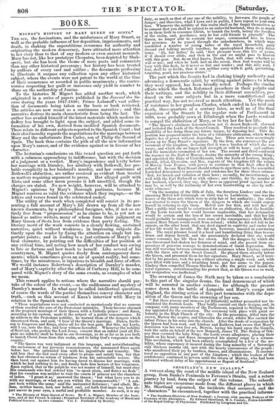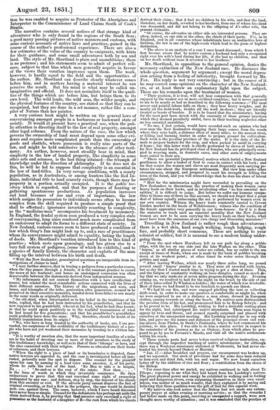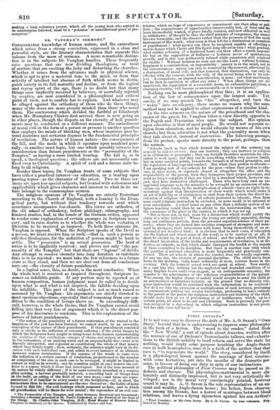SHORTLAND'S NEW ZEALAND. * A VOYAGE along the coast of the
middle island of the New Zealand group, from Banks's Peninsula to Foveaux's Straits, and a return journey by land, form the subject of this volume. The subordi- nate topics are excursions made from the different places in which Mr. Shortland sojourned, the incidents that occurred, and the " characters " he encountered, together with the practical informs-
• The Southern Districts of New Zealand ; a Journal, With passing Notices of the Customs of the Aborigines. By Edward Shortland, Id A. Cantab., Extra-Licentsat of the Royal College of Physicians. Published by Longman and Co.
tion he was enabled to acquire as Protector of the Aborigines and Interpreter to the Commissioner of Land Claims South of Cook's Straits.
The narrative contains several notices of that strange kind of adventurer who is only found in the regions of the South Seas ; a good many passing pictures of native manners and customs, with some curious accounts of native laws and practices, gained in the course of the author's professional experience. There are also a few estimates of the value of the country to emigrants, with hints for their guidance, and some small adventures both by sea and land. The style of Mr. Shortland is plain and unambitious; there is no pretence ; and his statements seem to admit of perfect reli- ance, subject to that bias which men generally acquire in favour of the views their vocation impresses upon them. The work, however, however' is hardly equal to the field and the opportunities of the author. Mr. Shortland can describe clearly whatever comes before him, and in matters having a material interest he can perceive the result. But his mind is what may be called un- imaginative and official. It does not assimilate itself to the quali- ties of the things which are before him, but brings them to its own level. The wild lands, the wild seas, the wilder people, and the physical features of the country, are stated so that they can be recognized, but they are done in a set manner, rather like a com- piler of Nature than her painter. A very curious book might be written on the general laws of conveyancing amongst people in a barbarous or backward state of society. It would at present have a practical use, when the pub- lic attention is directing itself to the law of real property, amongst other legal reforms. From the nature of the case, the law which governs the ownership of ]and must depend upon some other evi- dence and require more complicated proofs than the ownership of goods and chattels, where possession is really nine parts of the law, and might be held conclusive in the absence of other testi- mony. An author, however, must steadily bear in mind, that simplicity in the law of landed property, hke simplicity in some other arts and sciences, is the last thing attained—the triumph of knowledge under the direction of philosophy. If he does not do this, he will be led to suppose that complexity is an essential in the law of land-titles. In very savage conditions, with a scanty population, as in Australasia, or among hunters like the Red In- dians, individual title to land scarcely exists, though there may be property in a portion actually occupied. It is the public ter- ritory which is regarded, and that for purposes of hunting or gathering spontaneous productions. As population increases and land becomes of use and even of importance, the law which assigns its possession to individuals seems often to become complex from the skill required to produce a simple proof that shall be effectual ; ignorance invariably resorting to complexity, as the "medicine-man" accompanies his treatment by mummery. In England, the feudal system soon produced a very complex state of conveyancing, long since rendered much more complicated from an endeavour to adapt its forms to a different state of society. In New Zealand, various causes seem to have produced a condition of law which Gray's Inn might look up to, and a race of practitioners whom its conveyancers might admit to equality, bating the length of deeds. Mr. ghortland's vocation introduced him to this kind of
practice; rests upon genealogy, and has given rise to a very full system of pedigrees, (some of which he exhibits,) and to a species of family history, the character and exploits of the man filling up the interval between his birth and death.
" With the New Zealander, genealogical questions are inseparable from in- vestigations of claims to land. "I may further observe, that in tracing a pedigree from a particular source, when the line passes through a female, it is the constant practice to record the name of her husband; and hence an undesigned connexion was often discoverable between the statements derived from independent sources. "My informants did not content themselves with a bare recollection of names, but related the most remarkable actions connected with the lives of their different ancestors. The history of the migrations, and wars, and losses, and triumphs of the tribe, .generation after generation, seemed to be preserved in their retentive memories, handed down from father to son nearly in the same words as originally delivered.
"An old chief, when interrogated as to his belief in the traditions of his tribe, replied, that he had been instructed by his grandfather, and that he now repeated to his grandchild, who sat at his feet, what he had thus learnt; so that he could speak positively as to the truthful transmission of what he had beard for five generations ; and that his grandfather's grandfather could probably have done the same. Why, therefore, should he doubt of its faithful transmission from its origin ?
"We, who have so long trusted to the authority of books, are, I am per- suaded, too suspicious of the credibility of the traditionary history of a peo- ple who have not yet weakened their memories by trusting to a written lan- guage.
"It is worthy of mention also, that the more important families of a tribe are in the habit of devoting one or more of their members to the study of this traditionary knowledge, as well as to that of their tikanga' or laws, and the rites connected with their religion. Persons so educated are their books of reference, and their lawyers.
"When the right to a piece of land or its boundaries is disputed, these native lawyers are appealed to, and the ease is investigated before all inte- rested, generally near the spot in dispute. The counsel for the plaintiff opens his case by naming in a loud voice some ancestor, A, of his party, whom he calls the root of the land. `1Co Mea to taki o to kaigna. Na . . . " So-and-so is the root of the estate. Now then . . . . ' is the form of words in which they invariably commence. He then endeavours to prove that this root exercised some right of ownership undisputed by any one ; and deduces, step by step, the descent of his clients from this ancestor or root. If the adverse party cannot disprove the fact of original ownership, or find a flaw in the pedigree, the case would be decided nem. con. against them. The cases, however Which I have heard discussed have never been so simple. Counsel for the defendants has perhaps set aside the claim derived from A, by proving that that ancestor only exercised a right of possession as the husband of a daughter of B—the root from which his clients derived their claim ; that A had no children by his wife, and that the land, therefore, on her death, reverted to her brothers, from one of whom his client was descended, and did not belong to the offspring of A's other wife, the present claimants.
"Of course, the advocates on either side are interested persons. They are often, indeed, on one side or the other, the chiefs of their party. For, as in England, and in all countries whose inhabitants have an instinctive love of freedom, the law is one of the high-roads which lead to the posts of highest distinction.
"The above is an analysis of a case I once heard discussed; from which I first became aware that by native custom a husband had only a recognized right over his wife's land during her life, if she had no children, and that on her death without issue it reverted to her brothers."
Mr. Shortland, in opposition to the general opinion, denies the necessary extinction of the New Zealand race. He discusses the whole question, argument by argument ; except the moral depres- sion arising from a feeling of inferiority, brought forward by Mr. Fox. His reply is not very convincing ; but in the course of it he may correct some opinions on the character of the New Zealand- ers, or at least throw an explanatory light upon the subject. These are his remarks upon the treatment of women. " Their position, it is true, will not bear comparison with that generally enjoyed by the weaker sex in more civilized countries; but it never appeared to me to be nearly so bad as described in the following sentence—' The most severe and painful labour falls on them ; they bear heavy weights, and de nearly all the field-work, besides all the work in-doors ; they are literally treated as beasts of burden. It is to be feared that the missionaries, having for the most part been struck with the enormity of those grosser -practices which they deemed peculiarly sinful, have in their teaching neglected other no less essential moralities.'
" No one, I feel certain, would have recorded such an opinion who had ever seen the New Zealanders dragging their large canoes from the wood! where they were built, a distance often of many miles, to the nearest river, or felling and burning timber in order to prepare ground for cultivation.. Such work is the peculiar province of the males. It is the duty i of the fe- male to prepare baskets for the crop, and when packed to assist in carrying it home; but this latter work is chiefly performed by slaves of both sexes ; for New Zealand has its privileged class of females, who are principally occu- pied in weaving mats, in domestic cares, and other sorts of employments more suited to their sex.
" There are powerful [superstitious] motives which forbid a New Zealand gentleman to allow a basket of food to come in contact with his back ; and for that reason the women and slaves are most frequently seen carrying po- tatoes for sale about the European settlements. But view him under other circumstances, stripped, and prepared to exert his strength in felling the trees of the forest, and you will acknowledge that he does his share of lobo= manfully. " How far the missionaries might have succeeded in prevailing on the New Zealanders to discontinue the practice of making their women carry heavy loads on their backs, and in inculcating other no less essential mo- ralities,' it is difficult to judge. But before we suffer our humane sympa- thies to blame any of them on this account, we should not forget that a great deal of labour equally unbecoming the sex is performed by women even in our own country. Witness the heavy loads constantly carried to Covent Garden market on the heads of Welshwomen ; witness also the condition of the female apprentice very generally in our farm-houses : for if it is from the omission to teach such an essential morality that the New Zealand women are now to be seen carrying the heavy loads on their backs, what must have been the omissions of our own clergy and Dissenting ministers ?"
Travelling in New Zealand is rather rough than adventurous : there is a wet skin, hard rough walking, rough lodging, rough fare, and probably short commons. These are nothing to your colonist or soldier, but it is unusual to see a modern bishop under- going them.
" From the spot where Huruhuru left us our path lay along a pebble ridge, with the sea on one side and the lake Waihao on the other. This hapua,' as all similar pieces of water are called, has no'outlet to the sea except at times of floods, when one is made by the bank of pebbles breaking down at its weakest point ; at other times its water oozes through the pebbles and sand.
" After leaving Waihao, which was nearly three miles long, we passed several small hapua' similar to it. They were all crowded with ducks, but so shy that I wasted much time in trying to get a shot at them. This, and the fatigue of constantly walking on loose shingles, caused so much de- lay that we only made six or seven miles progress during the day. Evening coming on, we resolved to halt for the night on the beach by the side of one- of these lakes called Te Whakai-a-kohika the water of which was drinkable. Most of them we had found to be too brackish to quench our thirst.
" We had lit our fire, and were engaged pitching the tent or collecting drift-wood, in order to make our quarters as comfortable as might be, when we were surprised to see at a distance a man alone, dressed in European clothes, coming towards us along the beach. My natives soon distinguished the peculiar form of his hat, and pronounced him to be Bishop Selwyn : and so he proved to be. His Lordship, wishing to find a desirable resting-place for the night, had outstripped his native attendants. These soon began to appear by twos and threes, and seemed equally surprised and please with ourselves at the unexpected meeting. His Lordship invited me to sup with him, and gave me the names and distances of the principal rivers and rest- ing-places, from Pireka, in Banks's Peninsula, where he had commenced his journey, to this place. I was able to do him a similar service in respect to the remainder of hisjourney as far as Otakou ; from which place he pro- posed to Fe by sea to 'oveaux's Straits, and visit all the native settlements within his reach.
" These remote parts had never before received religious instruction, ex- cept through the imperfect teaching of native missionaries ; for although there was a Wesleyan missionary stationed at Waikouaiti, he had never ex- tended his travels beyond Otakou pr Moeraki. " Jan. 17.—After breakfast and prayers, our encampment was broken up, and we separated. Our stock of provisions had for some days been reduced to fern-root and dried fish, with tea and sugar. We now found ourselves better off by the addition of rice and flour ; a contribution from the stores of the Bishop. " For some time after we parted, my natives continued to talk about Te Pihopa; repeating to me what they had heard from his Lordship's natives. The great physical power and energy he exhibited in walking and in fording rapid and dangerous rivers, even surpassing themselves in their own excel- lences, was matter of so much wonder, that they explained it by saying and believing that these qualities were the gift of God for this especial work. " My natives also took notice that the Bishop had not made any extem- porary prayer at either evening or morning service; so that the remarks I had before made on this point, receiving so unexpected a support, were now thought more worthy of attention ; and it was concluded that the practice of
making a Lang voluntary prayer, which all the young men who aspired to be missionaries followed, must be a pokanoe; or unauthorized piece of pre-
sumption."




























 Previous page
Previous page